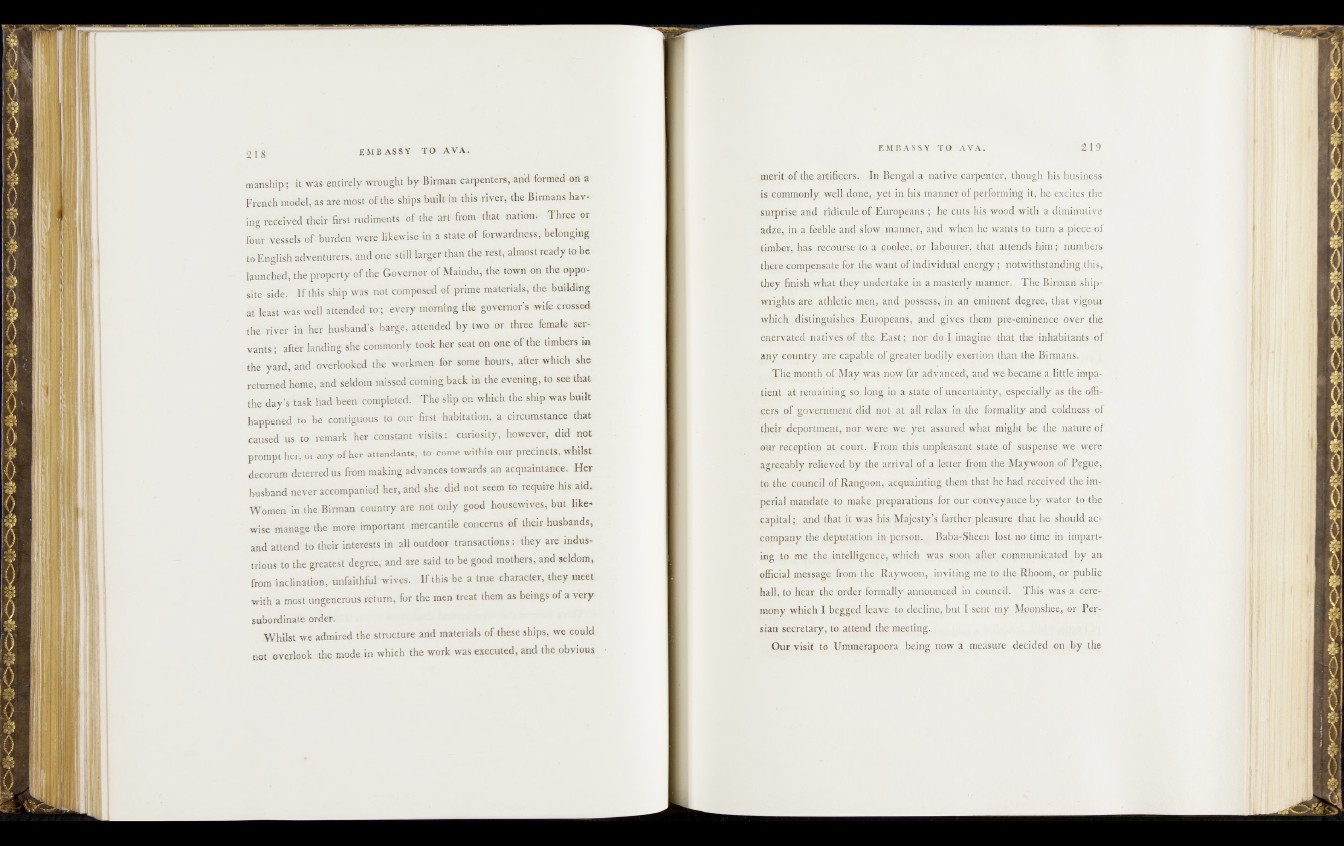
manship-; it was entirely, wrought by Birman carpenters, and formed-on a
French model, as are most of the ships built-in thisriver, the Birmans hav-
ing received their-dirst rudiments'?of the art from that nations Three or
four-vessels of Burden were likewise in a state of forwardness, belonging
to English adventiirem, and One still larger than the rest, almost ready tube
launched, the property of the Governor of Maindu, the town on the opposite
aide. If this ship was not composed of prime materials, the building
af least was well attended to; every morning the governor’s wife crossed
the river in her husband’s barge, attended b y two or three female servants;
after landing she commonly took her seat on one of the timbers in
the yard, and overlooked the workmen for some hours, after which she
returned home, -and seldom missed coming back :in the evening, to see that
the day’s task had been completed. The slip on which the ship was built
happened to be contiguous to our first, habitation, a circumstance that
caused us to remark her constant visits: curiosity, however, did not
prompt her, or any of her attendants, to come within our precincts, whilst
decorum deterred us from making advances towards an acquaintance. Her
husband never accompanied her, and she did not seem to require his aid.
Women in the Birman country are not only good housewives* but likewise
manage the more important mercantile concerns of their,husbands,
and attend to their interests in all outdoor transactions : they are industrious
to the greatest degree, and are said to be good mothers, and seldom*
from inclination, unfaithfiil wives. If this be a true character, they meet
with a most ungenerous return, for the men treat them as beings of-a very
subordinate order.
Whilst w e admired the structure and materials of these ships, we could
not overlook , the mode in which the work was executed, and the obvious
pierit uf.the^artiljagr.s. I n ^ e ^ g j J ^ ^ A i ^ ^ g i ^ j ^ ^ p n g 'h , his business
surprise and
,adz%inp
iftj.inber.. ha&..recoutse-U^i^i)’(jl^j.qidakqu\lv.jj,^Lih it jLtuidsjlmn
there.cpmpensate fim&eayant,oj.u.ii 1 ividi nntw itli^andhu^J.^s;
„they fiqish whafa they u^eriaLkerin atea^^>Y'.|maimer. T.lie B'irmani^m-
yvjrights are .athletic pen..iayd.npsse.ssi in . an.JeminemWd|&EH:e&.>that vigour
which „d^in g p ish ^ i Europeans, „an^gKekjitem^^e^eminence^psjerj.the
imepyated^natives^Qfjlhej East; .njjjr^do.Lgi^gin^tjhaktthe^inhgbi'taritS'pf
any.aguntj ^ a j^ canahlg, ( ^ g ^ ^ e r ^ ^ ^ ^ y ^ S |M ^ h a n 'rf^ J ^ ip an s ^
. . T he month ol May was now fa r .ad.vang.ed.,aB« i ^ fe„Cai4e^; ljSg.,.impar
tienl at jeroiLning so lopg infe^tatLiol puuLunLy.-espet i.dkjias (ho oilh-
gcis ol go\ujuncnt,djd^ti'ot11,it all relax .j-n^ojfemujality aqtLqildnesvUii
their.deportment nojpwpe -yye j ^ {a s ^ e ^ (what be]yhg vqatpre of
our reception ,,at n o p t, E f QJgdt|y£ papJ^aKuj t, s t^t,^f™^s^ens e f w€fic
agreealdv-fielpyedjJby the arrival of ad^tter^om^he Maywtabn^felfesgie,
in thfi rnii^ril nfRangoon. acauaintingi.th^< fcto i.shg hadrr.qlpMed.lh&ip-
ra rp l. pandate to.pak,q.prepa^ations.forfe^ r l c p n ^ e ^ ^ g f h y ^ .tp | t e j , ^ '
e s p ia l; and that q was his Maje^tyjs faithuplcas.ii^ .jth.itdi^sHp»iIliac>
cqmpany the .deputation in p p rsqn;^ ^ba§§h£$K in -;ipp|.r|r
ing to me the intelligepce, ydiieh ;vps,i span. rafj^rQ^g^qfl.iea,ted
ojEepI, message from the Raywopn, in y j^ jg ^ ^ |^ .t^ e {P;ho^p,|C^}pulfe
hall, to hear the order lormajly announced jmcpuncil^- ,TliN yasra-jetroj
p o n y which I begged J^wet to u d g fc ^ b u t I,s^pt;my., ft^ p n ^ te ^ a rf^ e r-
sian secretary, to attend the m eeting..
Our visit to Ummerapoora bejng now a measure decide^>’(Qn"by the